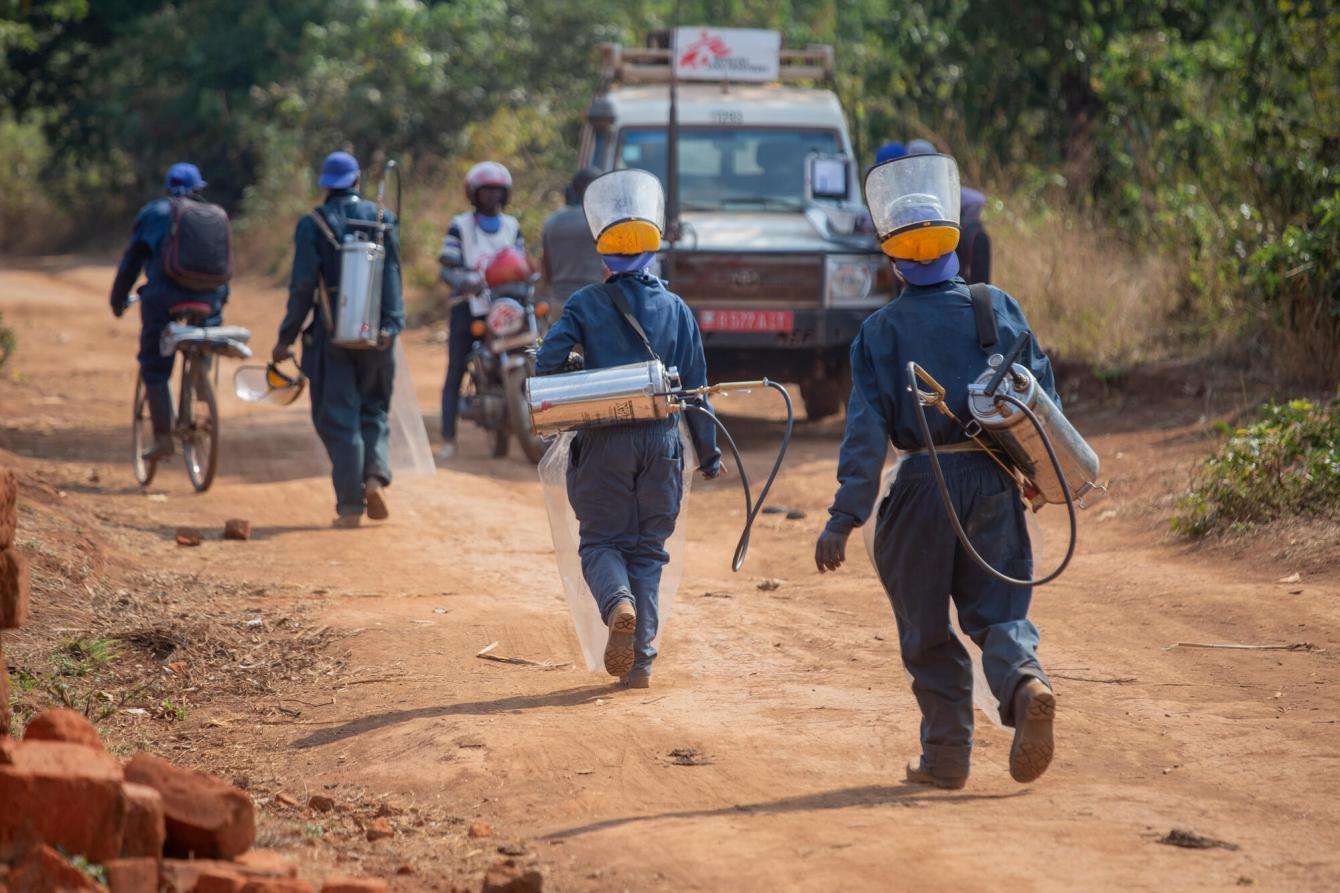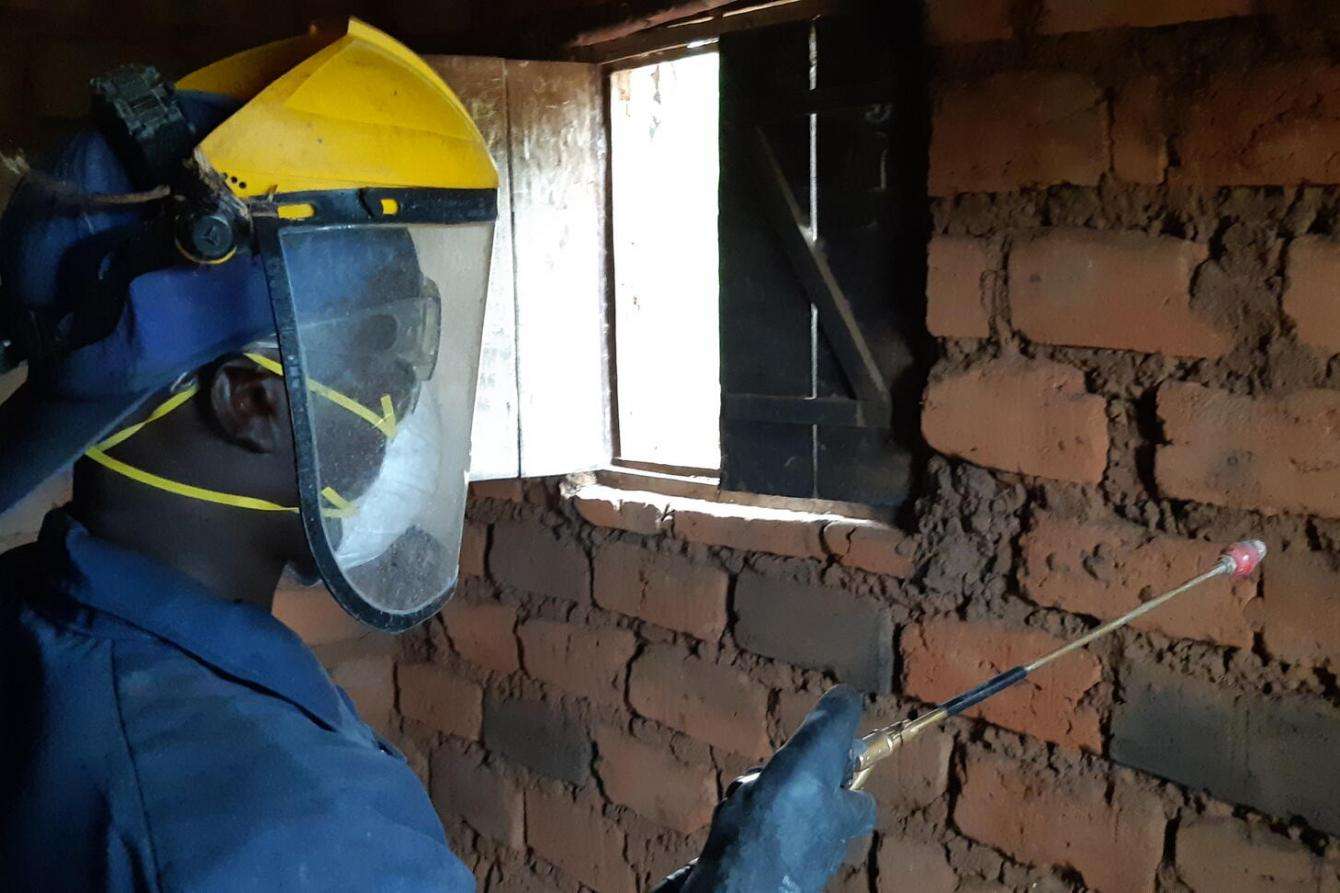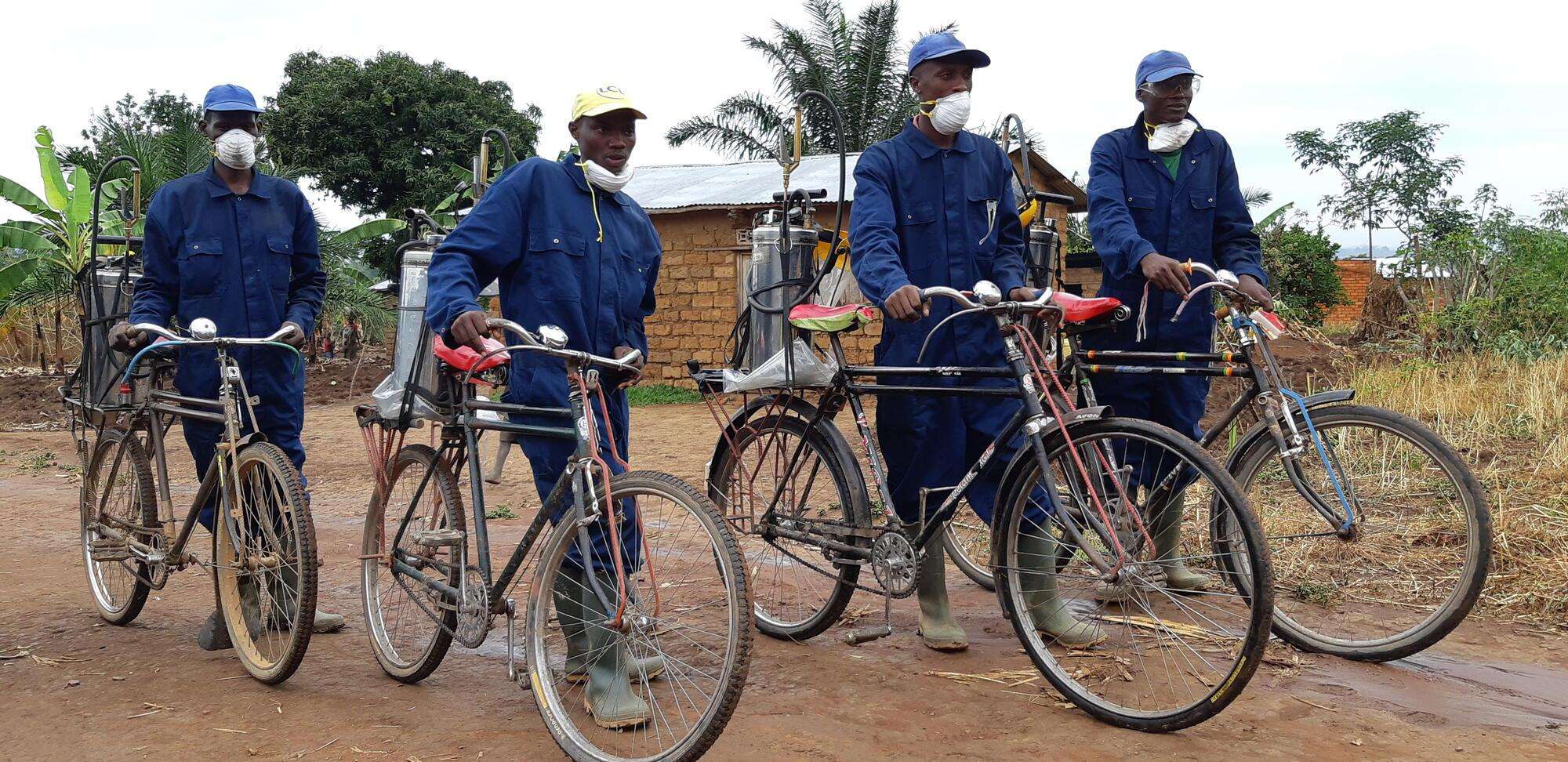Doctors Without Borders/Médecins Sans Frontières (MSF) teams have carried out a number of large-scale malaria prevention campaigns in eastern Burundi in recent years, most recently in the hills of Kinyinya. Their objective: to stop the disease at its source by reducing the number of mosquitoes that spread it.
"Come back and visit us!" Standing in the middle of a pile of his possessions, which have been moved outside his house for safekeeping, Benoît Misago watches the departure of the team of sprayers who just spent 20 minutes treating the walls and ceilings of his house with an insecticide that kills mosquitoes. Bottles and pumps on their backs, they cycle on to the next house.
Like the other inhabitants of Kumoso plain, this is the second time in two years that Misago has had his house treated in an anti-malaria spraying operation set up by MSF in Kinyinya district. In summer 2019, a team visited his home to present the project, explain the details, and answer all of his questions.
"I quickly agreed to them treating my house," says Misago. “At the time, we had a very big malaria problem here. Mosquitoes were flying everywhere. Children and adults were sick all the time. There were so many people in the hospital that we sometimes spent all day there. Fortunately, all this stopped after their visit. So I'm glad to see them again today."
An 80 percent drop in malaria cases
Malaria is a major health problem in Burundi. Endemic and the cause of regular outbreaks, the disease is the leading cause of hospitalization and death in young children. This is true of the entire African continent: Each year, more than 90 percent of the 400,000 deaths from malaria worldwide are recorded in Africa. Because there is no vaccine for the parasitic disease, prevention remains key and involves the use of antimalarial drugs and physical protection from mosquitoes, such as mosquito nets and enhanced sanitation.
Indoor residual spraying, or IRS, is one of these prevention techniques. Successfully implemented in many parts of the world, involves applying a long-lasting insecticide to the walls and ceilings of buildings—homes, barns, outhouses—that kills the mosquitoes that land there. Effective for months at a time, it drastically reduces the number of cases of malaria when combined with the use of mosquito nets.
"Last year, the spraying was a key factor in the 80 percent drop in malaria cases here," says Dr. Hippolyte Mboma, MSF's malaria project manager in Kinyinya district. "But to be effective, the spraying must be prepared, carried out, and repeated in an extremely meticulous manner, in close collaboration with the authorities and the population, and with the support of specialists. This technique cannot be improvised."
“Come and spray!"
It takes MSF and the health authorities several months to prepare each spraying campaign. First they need to select which insecticide to use, as the chemicals must be rotated to avoid mosquitoes developing resistance. Then they need to inform the local communities and encourage them to take part, plan the logistics, recruit and train the teams, and more.
“Kinyinya district has more than 68,000 homes scattered across the hills," says Dr. Mboma. “For the approach to be effective, you need to treat at least 85 percent of these homes. It takes incredible organization and energy. In particular, it is necessary to make sure that the inhabitants understand the project well and adhere to it, because it is a technique that they do not know. Hence the importance of working closely with local authorities and employing many community workers to answer all their questions."
Jeanine Arakaza, supervisor of one of the 78 spraying teams deployed in September 2020, agrees.
“Last year was the first time we sprayed homes here, and there were obviously quite a few questions,” she says. “There were a lot of information sessions, and in the end we managed to treat 95 percent of homes."
“This year, everyone is convinced. People saw the impact of the last campaign. They follow us and say: 'Come and spray our house, we need you, we don't want malaria at home!' It's really encouraging, We hope to do even better than last year."

Cutting-edge technique
In addition to mobilizing local people, state-of-the-art technical and logistical preparation is required to ensure the campaign is effective, safe, and environmentally friendly.
"Treating so many houses requires a huge investment in meeting environmental standards and waste management," explains Dr. Mboma. “This is a top priority for us. This year, we have 468 sprayers going up and down the hills treating houses, not counting hygienists, team leaders, or storekeepers. So many people to train in dosing, storage, cleaning, environmental management ... It is huge, but absolutely fundamental."
The other big challenge of a campaign like this is to cover so many houses in a short period of time. In Kinyinya, the campaign takes place in two 15-day phases, so that tens of thousands of homes are treated in less than a month.
In addition to being highly motivated and having strong leg muscles, the spraying teams have a very valuable technology helping them: A geographic information system (GIS).
"Long before the first sprayer set off on a bicycle, the entire area was meticulously mapped by MSF experts," says Dr. Mbomba. "We carry out aerial cartography on the basis of satellite images processed during 'mapathons,' and each house, each stable, each toilet is then listed by sending teams to the field equipped with geolocation devices. In this way, we have an exact vision of the number of houses, the topography and the paths available, so that we can plan the interventions and follow the progress day by day."
For Jeanine Arakaza, the daily progress monitoring sessions are one of the most pleasant moments of a supervisor's job. “We come back in the evening exhausted after the day’s work, but then we live a magical moment,” she says. "On the big screen, we see all the little dots change color depending on the results of the day. You see everything that has been done by your team, and by all the teams. You see where you have to go back to reach the objectives. And you completely forget the fatigue of the day. It gives you the courage to continue!"

Spraying is a huge help, but health care remains essential
Much more than a change of color on a map, Jeanine knows better than anyone the actual difference their work makes.
“Before being a supervisor here, I worked as a nurse in the intensive care unit,” she says. “I've seen too many people die from malaria. There are so many cases. I thought to myself that I had to switch to the preventive side, to reduce the workload in hospitals."
While spraying campaigns greatly reduce the number of patients with malaria, they do not eliminate the disease completely. People still need medical care for malaria symptoms, so MSF is supporting the provision of free malaria treatment in 14 health facilities across the district.
"It changes everything for us," says Félicité, who has brought one of her children to a health center in Kinyinya for a consultation. “In the past, when we fell ill we turned to traditional medicine or to marabouts [religious teachers], or we went to look for contraband drugs. Today, we know that we can come to the hospital and that the children will be treated well and free of charge. We come more quickly to be treated.”
Small victories matter
Reducing malaria and providing free healthcare is saving lives, but it is also helping households in other ways.
“All the money they used to spend on getting treatment, they can now invest elsewhere—on food, for example,” says Arakaza. “This also allows children to go to school, and parents to go to work in the fields instead of constantly coming to the hospital. Beyond their health, it will help them on a daily basis."
The fight against malaria on the African continent still has a long way to go and needs greater efforts to improve access to tools to prevent, diagnose, and treat the disease. But in the shadow of the overwhelming numbers, small battles are won. This year, for example, Jeanine's hope that the people of Kinyinya could be even better protected from the disease came true. At the end of the spraying campaign, 98 percent of houses in the area had been treated, protecting more than 311,000 residents for many months to come—until the next spraying campaign, which is scheduled for summer 2021.




